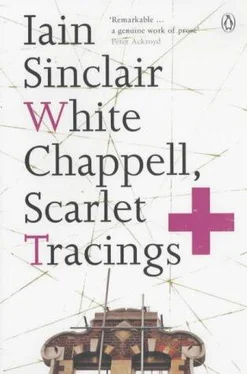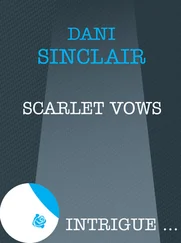‘We must use what we have been given: go back over the Ripper text, turn each cell of it — until it means something else, something beyond us.
‘Otherwise we never over-reach our obsessions. We’re doomed not to relive the past, but to die into it. To abandon the ambition to keep alive what never was, and what never will be, unless we make it so.
‘The conspiracy is all with time: those on the fringe of event simply disappear. Like the Kennedy assassination. There are no reliable witnesses. A sudden wound releases the unintegrated souls, psychic pus, fear and loathing, spectres of world conspiracy.
‘It’s like your bodybuilding — sorry — weight-training. How I describe you, is made into a lie: you change what you appear to be. You make your past a lie, but you do not eliminate it. Nor the fall to future decay.
‘I can’t believe, therefore, in anything I say. I repudiate this disbelief. There is no explanation that will redeem the time. And if I undermine the lies I am telling about this, this, this moment — I mean that we were never here, this conversation never took place — I am doing no more than re-writing a past that never, in fact, occurred. Disallowing the present. Aborting the future. It shifts, slips through our clumsy hands.
‘The words cover so many fears: are used to hold those fears back. What we can describe is what is known; and knowable. Words keep out the world. What we cannot describe, we cannot know: or truly want to know. How can we let go of all this and sink through the tremble and shiver of the leaves? The cancelled movements, wiped-over holes, the spaces? Those shapeless trees beyond the window, breaking cloud into bone: not holding back in disbelief.
‘The saints had a word that could redeem it. A word that I will not use. It cost them too much. They kept out the world to reach it. I cannot say it, even to transcend this pain. Because that word is tied to everything that cannot be reached and is most desired.’
The set is broken. Nothing remains: no pretence that this is a record of any true dialogue. The gym does exist, but that was another country.
We have gone so fast that we are ahead: we are describing what has not yet happened, and what does not now need to happen. We have made arrangements to foreshorten the future.
Always erasure, not exorcism. Exorcism merely confers status on the exorcist: who claims, falsely, that he has the power to unmake. Has tricks to stake the demonic, nail the black heart.
Erasure acts over, is a discretion. Joblard’s performance in the warehouse erased itself so that the voices were set free. They wound back the memory of the future.
There is no need to rub out the inscription on the stone, for as soon as it has been read, it fades from before your eyes.
We pushed the child out into the air, to release him in the small park at the back of St George the Martyr, Tabard Street. We sat on a bench beneath the spread of a mottled London plane tree. It was raised ground. The wall beyond us was a collage of dates and periods and colours, with sealed doors, set at a custodial height. There was a plaque: ‘This site was originally the Marshalsea prison made famous by the late Charles Dickens in his well known novel “Little Dorrit”’.
Strength had transferred to the child. We are now drained, witnesses, merely. He held the horns of the buggy and wobbled over the grass, not walking free, nor falling to the ground.
On another bench, under the wall, a man was sitting reading. We recognised him as the barman from the Wheatsheaf. He did not see us. Head over, stern glasses, trembling; back of his hand wiping his eyes. Not weeping, laughing. The solitary celebrant of such laboriously constructed pathos.
From the hill he watched the people crossing the fields, by tracks and pathways, to secure a good position. There were families with small children who had risen in darkness, milk on the table, a slab of coarse bread in the hand, walked twenty miles and further, to be here. The women in black, none of the men bareheaded, and even the children are hushed, imitating the long faces of their elders.
By the time that the sun climbs out of the plantation the whole length of the road, from the station to the church, is marked out with villagers and country people.
He stands watching them; he might be a blasted tree-stump. No breath in him. Now the train has arrived from the city. Smoke and pomp. Ha! The dignitaries awkward as their own ghosts, creaking in starch, scarcely able to articulate their limbs. The gleaming brass of the coffin. ‘William Withey Gull, Bt., 1816–1890’ . He is boxed in oak. He is sealed, no breath upon the varnished wood. But his eyes are open. The business is done. Done justly.
A still morning, painted on glass. Black smoke climbs straight from the train. The hats are pipes, polished in stout. The white candle-wax faces. Gloved hands. Walk humbly, walk on. Lord Justice Lindley, Sir Joseph Lister, Sir Henry Wentworth Acland, Sir James Paget, Serjeant Surgeon to Her Royal Highness, Queen Victoria. Walk side by side, and slowly. Struggle as you climb. Wind out of the station and up the hill towards the village; no eyes for the dull fields. Eyes set on the braided tails of the great black horses. Heroic!
This is no coffin of stones. Gull’s eyes are open. At last he looks up, out through the thin fibres of wood, at a clear sky. Justified. England marches to a slow beat. Hearts are slowed. The earth turns slowly. Death furls the branches of the trees.
To the village, the lych-gate of St Michael’s church. Gull’s leg is crossed, arms over chest, a penguin mockery. Hands pressed together, his own effigy, Knight of Landermere. Features lose all detail: a syphilis of time. He weathers.
The moving procession stretches over the nautical mile from station to church, from bishops and baronets at the grave’s edge, through surgeons, gentry, wharfingers on the hill, tradesmen, small farmers, fishermen, poachers and lurchers, to the children on the platform.
The ceremony begins.
From the high ground at Thorpe Hall, Gull watches them carry him to his grave. Sees earth fall over his eyes. He is enclosed, nailed down, weighted. In a vault that is big enough for three men. He is free of his own history.
The training began in the private plantation of the Hall. Gull was blind, his back to the window. All the windows painted over with pitch; holding out the star needles, the bride light. Not doctor now, nor patient. Not killer. Nor victim. The house had been in his mind for so many years. Lawns, conservatory, ivy. Flat undecorated front, long windows. Hide it in trees, build up the walls. This is truly nowhere. Gull is the house. That is how he dreamt it. This is what he knew.
The ash of matter, of unsmoked Havanas, powdered his sleeve. All matter is dust. Pulse in his neck. He crosses the floor, blind, eyes trained to see nothing, hand on the cage of ribs, a bird in his chest. Out of time. Cycles of birth occur at margin; decomposing light. His hand on the sill: a glove of white powders, stapled with hair, dissected to vein and fibre. A tide-map of the estuary. An illusion of stillness.
The training began in the private plantation. Choirs of stunted and infertile apple trees were interwoven, Merovingian bloodlines; avenues had been hacked and burnt into this thicket. Brambles, wild thorns, blackberries swollen with sour rain; unpicked, flavourless wart clusters: they surround the orchard. Pig-turned mud. Dark archways; a lattice-work of blades and starlight, a scalping rooftree. Green moulds brushing their stiff corduroys. Lichen bruises on torn skin. The stone of a cracked fountain. They are entangled in a nightmare.
Читать дальше












